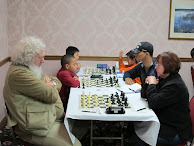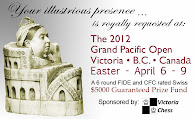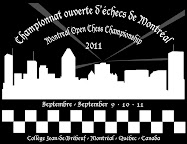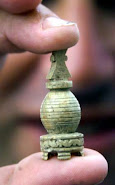 There is evidence that points to at least three ancient games having their roots in divination, and warfare was not the primary motif or even a consideration at the beginning: in ancient Egypt, the games of Mehen (the serpent game) and Senet, and in ancient China, the game of Liubo (Image: liubo board, c. 400 BCE). In later times in ancient Egypt, Mehen ceased to be played for reasons that are unknown, although some have speculated that it was because playing a game on the back of a God (actually, a Goddess, but that's another story) was insulting. Senet and the much later game of Liubo could be played "straight" - that is - as a board game of chance - or as a game of divination. Two historians of whom I am aware have pointed to Liubo as a direct predecessor of chess: David Li and Joseph Needham. Thanks to the research of several historians and ethnographers, it is now generally accepted that the earliest board games probably had their roots in attempts to determine the future.
The Sanskrit word "Chaturanga", means "four parts", or "Army", which for the ancient Indians was compromised by 4 parts. It is a game of 6th century BCE Indian origins consisting of two small armies with unique units, on an 8 x 8 board.Chaturanga predates Chess, but only in the little evidence had in artifact, not by popular record. Most likely a Persian invention, Chaturanga beats Chess in record by only a number of years.
I believe most chess historians are in general agreement that chaturanga was a game invented or evolved sometime during the sixth century CE, not the 6th century BCE. Some posit an earlier date for invention or evolution of the game, but to my recollection, not as far back as the 6th century BCE (except Goddesschess). Perhaps Mr. Dinehart made a typo.
The Sanskrit chaturanga literally means four ("chatur") and limbs (as in arms and legs) ("anga"). As such, it does not, per se, refer to anybody's army, Indian or otherwise. Chaturanga does, however, have a counterpart in the Pahlavi (middle Persian) word chatrang, which means the mandrake plant (it has the same meaning in modern Farsi). Sanskrit and Pahlavi, and their descendants, are all derived from an ancestral "mother tongue" - proto-Indo-European, placing the sub-continent of India firmly in the "west" linguistically. I can't locate it in my notes at the moment, but I believe the Pahlavi word for four is chatar, which is very close to the Sanskrit chatur four.
Chess is an Arab invention first mentioned by the court poet Bana, in a poem he wrote between "625 and 640 CE"[3].
I haven't studied Bana's quotes, and so I'll only say this: most chess historians are in agreement that chess is NOT an invention of the Arabs, but was adopted by them as the game shatranj (from Pahlavi chatrang) after the Persians were conquered in the mid-7th century CE.
Thanks to the trade routes of the ancient world Chess along with Chaturanga were both brought west to the likes of Africa, Spain, Germany, and the Ottoman Empire. The game evolved into chess and hung around for until 2400 years later when things got interesting.
There is a lot of evidence of trade and cultural exchanges from the far east (China) to ancient Rome and beyond, over an extended period of time during period of time well within the historical, along the Silk Road routes. There is a great deal of evidence of direct trade and cultural exchanges between ancient Persia and ancient China dating to the first ruler of the Tang Dynasty (c. 600's CE). Who knows how long such trade might have existed for which evidence no longer exists, or has yet to be discovered? For instance, there is suggestive evidence that the trade in tin between the Middle East and mines in Cornwall existed as far back as the Bronze Age. There is even evidence of some ancient Egyptian pre-dynastic maces showing up in graves in far northwestern China, dating back to approximately 3500 BCE.
What historians currently state is that the Arabs spread the game of chess they called shatranj as they conquered more and more lands, including modern-day Spain and Portugal. The Arab historians are quite honest in admitting that their game shatranj was taken from the Persian game chatrang. Murray wrote about how the game shatranj was carried into parts of India that were subsequently conquered by the Arabs and somehow morphed into a four-handed game where the pieces were moved depending on the throw of dice - also called chaturanga. Thus the confusion in trying to determine just what game was talked about in some written historical accounts. In any event, the four-handed dice-game called chaturanga was a far cry from the pure strategy game played by the Persians in the 6th century CE.
It is documented that "chess" was spread by the Moslems (Arabs) during their conquests in the 7th and 8th centuries CE, and it is also documented that the game was spread by Vikings and other traders, including the "Rus" during the 8th to 11th centuries CE.
Well, that's it, more or less in a nut-shell. There's much more - a veritable tapestry so rich in interconnecting threads that it is nearly inpenetrable. We at Goddesschess call it "The Weave." Like any good weavers, however, rather than being overwhelmed by the completed product, we start with a single thread and follow it as best we can to its origin. Pick a thread - any thread - and follow it to where it may lead. Please pay attention to all of those intersections with other threads along the way, and to where they may lead, too.
Okay, end of harangue! I'm hungry, it's well past my supper time!
There is evidence that points to at least three ancient games having their roots in divination, and warfare was not the primary motif or even a consideration at the beginning: in ancient Egypt, the games of Mehen (the serpent game) and Senet, and in ancient China, the game of Liubo (Image: liubo board, c. 400 BCE). In later times in ancient Egypt, Mehen ceased to be played for reasons that are unknown, although some have speculated that it was because playing a game on the back of a God (actually, a Goddess, but that's another story) was insulting. Senet and the much later game of Liubo could be played "straight" - that is - as a board game of chance - or as a game of divination. Two historians of whom I am aware have pointed to Liubo as a direct predecessor of chess: David Li and Joseph Needham. Thanks to the research of several historians and ethnographers, it is now generally accepted that the earliest board games probably had their roots in attempts to determine the future.
The Sanskrit word "Chaturanga", means "four parts", or "Army", which for the ancient Indians was compromised by 4 parts. It is a game of 6th century BCE Indian origins consisting of two small armies with unique units, on an 8 x 8 board.Chaturanga predates Chess, but only in the little evidence had in artifact, not by popular record. Most likely a Persian invention, Chaturanga beats Chess in record by only a number of years.
I believe most chess historians are in general agreement that chaturanga was a game invented or evolved sometime during the sixth century CE, not the 6th century BCE. Some posit an earlier date for invention or evolution of the game, but to my recollection, not as far back as the 6th century BCE (except Goddesschess). Perhaps Mr. Dinehart made a typo.
The Sanskrit chaturanga literally means four ("chatur") and limbs (as in arms and legs) ("anga"). As such, it does not, per se, refer to anybody's army, Indian or otherwise. Chaturanga does, however, have a counterpart in the Pahlavi (middle Persian) word chatrang, which means the mandrake plant (it has the same meaning in modern Farsi). Sanskrit and Pahlavi, and their descendants, are all derived from an ancestral "mother tongue" - proto-Indo-European, placing the sub-continent of India firmly in the "west" linguistically. I can't locate it in my notes at the moment, but I believe the Pahlavi word for four is chatar, which is very close to the Sanskrit chatur four.
Chess is an Arab invention first mentioned by the court poet Bana, in a poem he wrote between "625 and 640 CE"[3].
I haven't studied Bana's quotes, and so I'll only say this: most chess historians are in agreement that chess is NOT an invention of the Arabs, but was adopted by them as the game shatranj (from Pahlavi chatrang) after the Persians were conquered in the mid-7th century CE.
Thanks to the trade routes of the ancient world Chess along with Chaturanga were both brought west to the likes of Africa, Spain, Germany, and the Ottoman Empire. The game evolved into chess and hung around for until 2400 years later when things got interesting.
There is a lot of evidence of trade and cultural exchanges from the far east (China) to ancient Rome and beyond, over an extended period of time during period of time well within the historical, along the Silk Road routes. There is a great deal of evidence of direct trade and cultural exchanges between ancient Persia and ancient China dating to the first ruler of the Tang Dynasty (c. 600's CE). Who knows how long such trade might have existed for which evidence no longer exists, or has yet to be discovered? For instance, there is suggestive evidence that the trade in tin between the Middle East and mines in Cornwall existed as far back as the Bronze Age. There is even evidence of some ancient Egyptian pre-dynastic maces showing up in graves in far northwestern China, dating back to approximately 3500 BCE.
What historians currently state is that the Arabs spread the game of chess they called shatranj as they conquered more and more lands, including modern-day Spain and Portugal. The Arab historians are quite honest in admitting that their game shatranj was taken from the Persian game chatrang. Murray wrote about how the game shatranj was carried into parts of India that were subsequently conquered by the Arabs and somehow morphed into a four-handed game where the pieces were moved depending on the throw of dice - also called chaturanga. Thus the confusion in trying to determine just what game was talked about in some written historical accounts. In any event, the four-handed dice-game called chaturanga was a far cry from the pure strategy game played by the Persians in the 6th century CE.
It is documented that "chess" was spread by the Moslems (Arabs) during their conquests in the 7th and 8th centuries CE, and it is also documented that the game was spread by Vikings and other traders, including the "Rus" during the 8th to 11th centuries CE.
Well, that's it, more or less in a nut-shell. There's much more - a veritable tapestry so rich in interconnecting threads that it is nearly inpenetrable. We at Goddesschess call it "The Weave." Like any good weavers, however, rather than being overwhelmed by the completed product, we start with a single thread and follow it as best we can to its origin. Pick a thread - any thread - and follow it to where it may lead. Please pay attention to all of those intersections with other threads along the way, and to where they may lead, too.
Okay, end of harangue! I'm hungry, it's well past my supper time!
Wednesday, May 27, 2009
Faulty Chess History - Arrggghhhh!
Hola darlings!
I've had a very bad day. It was raining hard this morning when I left for the office. It was difficult enough to force myself out of a cozy warm bed at 6 a.m. while the rain was pounding on the roof. The half-mile walk to the bus stop at 7:20 a.m. resulted in me getting rather wet from the waist down from the blowing rain, and my shoes sprung leaks, so I went to work with wet socks. Oh YUCK!
It stopped raining shortly after I boarded the bus. Of course. It started raining again shortly before I had to get off the bus to hike the blocks to the office. Of course. There is extra walking now since the bus has been detoured by summertime street repairs. Of course course.
I was not in a very good mood when I got to the office. I had a pile of work still sitting from the day before (my first day back from nearly 3 weeks vacation), my hair looked like crap and I was hungry. I did get a very fat-filled breakfast sandwich from the cafeteria, which I scarfed down at my desk while going through my emails and prioritizing the work for the day. My hair - well, I won't even go there.
I am so glad to be home tonight. The rain finally stopped and the fog has blown away. I swear my grass and plants have sprung up inches since the rain started in earnest late last night. Yes, yes, as an amateur gardener I realize the importance of regular deep watering. And so I could rationalize my discomfort and mushy socks (still mushy when I got home, eeeuuuuuwww) for the greater good of my water-starved garden. So what if the rain arrived 24 hours later than first forecast, that caused me to postpone doing serious watering with the sprinkler in the back yard on Sunday, because my herbaceous friends were looking somewhat peaked. And I felt so guilty, like I was personally murdering each and every blade of grass...
Arrrgggghhhh. Anyway, I get home tonight, dispose of the stinking mushy socks, dry off, and settle down for a night of blogging since there is absolutely nothing decent on network television, and I'm too cheap to subscribe to cable or satellite.
But now I'm all p.o.'d again, darlings, and it is all because of THIS MAN!
I am not a member of Gamasutra, and I do not wish to become a member - I mean, come on - Gamasutra? Please - give me back my Kama Sutra! And no, that's not a World War II kamikaze game involving flying planes into battle cruisers.
No offense to Mr. Dinehart, and I mean that sincerely. It's not the easiest thing in the world to go back into the mists of time trying to tease out the true origins of the game we call chess. We started out as rank amateurs and ten years later we're still amateurs - although not so rank as we used to be :)) For the vast majority of people alive today, I'd say somewhere between 99.94% and 99.99% - how chess came to be is not a compelling question.
But for us at Goddesschess, it is. I'd say it has become almost an obsession (eek!) Suffice to say, after 10 years of continuous work, we believe we have accumulated sufficient evidence to say with confidence that "H.J.R. Murray got it wrong, baby!"
Okay - I don't hear the trumpet fanfare I want - drat! Which only goes to show you. To most people, this ain't an important issue! But to us, it is. And so I'd like to go on the record with what we think is a more correct statement of facts about the origins of chess. Without going into too much boring detail.
Before I get started, I'd like to state for the record that I thought Mr. Dinehart's blog post was great. I found it entertaining, charming, humorous and informative, all about a subject I could care less about - except for the history of chess part! Well done, Mr. Dinehart. Now, as to that:
So I set out to do research, and like most things in western culture, one need look east to find their roots. I started with Chess and then dug a little deeper. It lead me to Chaturaga, a game whose rules are mostly lost, but the pieces remain. This, the first serious war-game, came before Europe was even a dream.
 There is evidence that points to at least three ancient games having their roots in divination, and warfare was not the primary motif or even a consideration at the beginning: in ancient Egypt, the games of Mehen (the serpent game) and Senet, and in ancient China, the game of Liubo (Image: liubo board, c. 400 BCE). In later times in ancient Egypt, Mehen ceased to be played for reasons that are unknown, although some have speculated that it was because playing a game on the back of a God (actually, a Goddess, but that's another story) was insulting. Senet and the much later game of Liubo could be played "straight" - that is - as a board game of chance - or as a game of divination. Two historians of whom I am aware have pointed to Liubo as a direct predecessor of chess: David Li and Joseph Needham. Thanks to the research of several historians and ethnographers, it is now generally accepted that the earliest board games probably had their roots in attempts to determine the future.
The Sanskrit word "Chaturanga", means "four parts", or "Army", which for the ancient Indians was compromised by 4 parts. It is a game of 6th century BCE Indian origins consisting of two small armies with unique units, on an 8 x 8 board.Chaturanga predates Chess, but only in the little evidence had in artifact, not by popular record. Most likely a Persian invention, Chaturanga beats Chess in record by only a number of years.
I believe most chess historians are in general agreement that chaturanga was a game invented or evolved sometime during the sixth century CE, not the 6th century BCE. Some posit an earlier date for invention or evolution of the game, but to my recollection, not as far back as the 6th century BCE (except Goddesschess). Perhaps Mr. Dinehart made a typo.
The Sanskrit chaturanga literally means four ("chatur") and limbs (as in arms and legs) ("anga"). As such, it does not, per se, refer to anybody's army, Indian or otherwise. Chaturanga does, however, have a counterpart in the Pahlavi (middle Persian) word chatrang, which means the mandrake plant (it has the same meaning in modern Farsi). Sanskrit and Pahlavi, and their descendants, are all derived from an ancestral "mother tongue" - proto-Indo-European, placing the sub-continent of India firmly in the "west" linguistically. I can't locate it in my notes at the moment, but I believe the Pahlavi word for four is chatar, which is very close to the Sanskrit chatur four.
Chess is an Arab invention first mentioned by the court poet Bana, in a poem he wrote between "625 and 640 CE"[3].
I haven't studied Bana's quotes, and so I'll only say this: most chess historians are in agreement that chess is NOT an invention of the Arabs, but was adopted by them as the game shatranj (from Pahlavi chatrang) after the Persians were conquered in the mid-7th century CE.
Thanks to the trade routes of the ancient world Chess along with Chaturanga were both brought west to the likes of Africa, Spain, Germany, and the Ottoman Empire. The game evolved into chess and hung around for until 2400 years later when things got interesting.
There is a lot of evidence of trade and cultural exchanges from the far east (China) to ancient Rome and beyond, over an extended period of time during period of time well within the historical, along the Silk Road routes. There is a great deal of evidence of direct trade and cultural exchanges between ancient Persia and ancient China dating to the first ruler of the Tang Dynasty (c. 600's CE). Who knows how long such trade might have existed for which evidence no longer exists, or has yet to be discovered? For instance, there is suggestive evidence that the trade in tin between the Middle East and mines in Cornwall existed as far back as the Bronze Age. There is even evidence of some ancient Egyptian pre-dynastic maces showing up in graves in far northwestern China, dating back to approximately 3500 BCE.
What historians currently state is that the Arabs spread the game of chess they called shatranj as they conquered more and more lands, including modern-day Spain and Portugal. The Arab historians are quite honest in admitting that their game shatranj was taken from the Persian game chatrang. Murray wrote about how the game shatranj was carried into parts of India that were subsequently conquered by the Arabs and somehow morphed into a four-handed game where the pieces were moved depending on the throw of dice - also called chaturanga. Thus the confusion in trying to determine just what game was talked about in some written historical accounts. In any event, the four-handed dice-game called chaturanga was a far cry from the pure strategy game played by the Persians in the 6th century CE.
It is documented that "chess" was spread by the Moslems (Arabs) during their conquests in the 7th and 8th centuries CE, and it is also documented that the game was spread by Vikings and other traders, including the "Rus" during the 8th to 11th centuries CE.
Well, that's it, more or less in a nut-shell. There's much more - a veritable tapestry so rich in interconnecting threads that it is nearly inpenetrable. We at Goddesschess call it "The Weave." Like any good weavers, however, rather than being overwhelmed by the completed product, we start with a single thread and follow it as best we can to its origin. Pick a thread - any thread - and follow it to where it may lead. Please pay attention to all of those intersections with other threads along the way, and to where they may lead, too.
Okay, end of harangue! I'm hungry, it's well past my supper time!
There is evidence that points to at least three ancient games having their roots in divination, and warfare was not the primary motif or even a consideration at the beginning: in ancient Egypt, the games of Mehen (the serpent game) and Senet, and in ancient China, the game of Liubo (Image: liubo board, c. 400 BCE). In later times in ancient Egypt, Mehen ceased to be played for reasons that are unknown, although some have speculated that it was because playing a game on the back of a God (actually, a Goddess, but that's another story) was insulting. Senet and the much later game of Liubo could be played "straight" - that is - as a board game of chance - or as a game of divination. Two historians of whom I am aware have pointed to Liubo as a direct predecessor of chess: David Li and Joseph Needham. Thanks to the research of several historians and ethnographers, it is now generally accepted that the earliest board games probably had their roots in attempts to determine the future.
The Sanskrit word "Chaturanga", means "four parts", or "Army", which for the ancient Indians was compromised by 4 parts. It is a game of 6th century BCE Indian origins consisting of two small armies with unique units, on an 8 x 8 board.Chaturanga predates Chess, but only in the little evidence had in artifact, not by popular record. Most likely a Persian invention, Chaturanga beats Chess in record by only a number of years.
I believe most chess historians are in general agreement that chaturanga was a game invented or evolved sometime during the sixth century CE, not the 6th century BCE. Some posit an earlier date for invention or evolution of the game, but to my recollection, not as far back as the 6th century BCE (except Goddesschess). Perhaps Mr. Dinehart made a typo.
The Sanskrit chaturanga literally means four ("chatur") and limbs (as in arms and legs) ("anga"). As such, it does not, per se, refer to anybody's army, Indian or otherwise. Chaturanga does, however, have a counterpart in the Pahlavi (middle Persian) word chatrang, which means the mandrake plant (it has the same meaning in modern Farsi). Sanskrit and Pahlavi, and their descendants, are all derived from an ancestral "mother tongue" - proto-Indo-European, placing the sub-continent of India firmly in the "west" linguistically. I can't locate it in my notes at the moment, but I believe the Pahlavi word for four is chatar, which is very close to the Sanskrit chatur four.
Chess is an Arab invention first mentioned by the court poet Bana, in a poem he wrote between "625 and 640 CE"[3].
I haven't studied Bana's quotes, and so I'll only say this: most chess historians are in agreement that chess is NOT an invention of the Arabs, but was adopted by them as the game shatranj (from Pahlavi chatrang) after the Persians were conquered in the mid-7th century CE.
Thanks to the trade routes of the ancient world Chess along with Chaturanga were both brought west to the likes of Africa, Spain, Germany, and the Ottoman Empire. The game evolved into chess and hung around for until 2400 years later when things got interesting.
There is a lot of evidence of trade and cultural exchanges from the far east (China) to ancient Rome and beyond, over an extended period of time during period of time well within the historical, along the Silk Road routes. There is a great deal of evidence of direct trade and cultural exchanges between ancient Persia and ancient China dating to the first ruler of the Tang Dynasty (c. 600's CE). Who knows how long such trade might have existed for which evidence no longer exists, or has yet to be discovered? For instance, there is suggestive evidence that the trade in tin between the Middle East and mines in Cornwall existed as far back as the Bronze Age. There is even evidence of some ancient Egyptian pre-dynastic maces showing up in graves in far northwestern China, dating back to approximately 3500 BCE.
What historians currently state is that the Arabs spread the game of chess they called shatranj as they conquered more and more lands, including modern-day Spain and Portugal. The Arab historians are quite honest in admitting that their game shatranj was taken from the Persian game chatrang. Murray wrote about how the game shatranj was carried into parts of India that were subsequently conquered by the Arabs and somehow morphed into a four-handed game where the pieces were moved depending on the throw of dice - also called chaturanga. Thus the confusion in trying to determine just what game was talked about in some written historical accounts. In any event, the four-handed dice-game called chaturanga was a far cry from the pure strategy game played by the Persians in the 6th century CE.
It is documented that "chess" was spread by the Moslems (Arabs) during their conquests in the 7th and 8th centuries CE, and it is also documented that the game was spread by Vikings and other traders, including the "Rus" during the 8th to 11th centuries CE.
Well, that's it, more or less in a nut-shell. There's much more - a veritable tapestry so rich in interconnecting threads that it is nearly inpenetrable. We at Goddesschess call it "The Weave." Like any good weavers, however, rather than being overwhelmed by the completed product, we start with a single thread and follow it as best we can to its origin. Pick a thread - any thread - and follow it to where it may lead. Please pay attention to all of those intersections with other threads along the way, and to where they may lead, too.
Okay, end of harangue! I'm hungry, it's well past my supper time!
 There is evidence that points to at least three ancient games having their roots in divination, and warfare was not the primary motif or even a consideration at the beginning: in ancient Egypt, the games of Mehen (the serpent game) and Senet, and in ancient China, the game of Liubo (Image: liubo board, c. 400 BCE). In later times in ancient Egypt, Mehen ceased to be played for reasons that are unknown, although some have speculated that it was because playing a game on the back of a God (actually, a Goddess, but that's another story) was insulting. Senet and the much later game of Liubo could be played "straight" - that is - as a board game of chance - or as a game of divination. Two historians of whom I am aware have pointed to Liubo as a direct predecessor of chess: David Li and Joseph Needham. Thanks to the research of several historians and ethnographers, it is now generally accepted that the earliest board games probably had their roots in attempts to determine the future.
The Sanskrit word "Chaturanga", means "four parts", or "Army", which for the ancient Indians was compromised by 4 parts. It is a game of 6th century BCE Indian origins consisting of two small armies with unique units, on an 8 x 8 board.Chaturanga predates Chess, but only in the little evidence had in artifact, not by popular record. Most likely a Persian invention, Chaturanga beats Chess in record by only a number of years.
I believe most chess historians are in general agreement that chaturanga was a game invented or evolved sometime during the sixth century CE, not the 6th century BCE. Some posit an earlier date for invention or evolution of the game, but to my recollection, not as far back as the 6th century BCE (except Goddesschess). Perhaps Mr. Dinehart made a typo.
The Sanskrit chaturanga literally means four ("chatur") and limbs (as in arms and legs) ("anga"). As such, it does not, per se, refer to anybody's army, Indian or otherwise. Chaturanga does, however, have a counterpart in the Pahlavi (middle Persian) word chatrang, which means the mandrake plant (it has the same meaning in modern Farsi). Sanskrit and Pahlavi, and their descendants, are all derived from an ancestral "mother tongue" - proto-Indo-European, placing the sub-continent of India firmly in the "west" linguistically. I can't locate it in my notes at the moment, but I believe the Pahlavi word for four is chatar, which is very close to the Sanskrit chatur four.
Chess is an Arab invention first mentioned by the court poet Bana, in a poem he wrote between "625 and 640 CE"[3].
I haven't studied Bana's quotes, and so I'll only say this: most chess historians are in agreement that chess is NOT an invention of the Arabs, but was adopted by them as the game shatranj (from Pahlavi chatrang) after the Persians were conquered in the mid-7th century CE.
Thanks to the trade routes of the ancient world Chess along with Chaturanga were both brought west to the likes of Africa, Spain, Germany, and the Ottoman Empire. The game evolved into chess and hung around for until 2400 years later when things got interesting.
There is a lot of evidence of trade and cultural exchanges from the far east (China) to ancient Rome and beyond, over an extended period of time during period of time well within the historical, along the Silk Road routes. There is a great deal of evidence of direct trade and cultural exchanges between ancient Persia and ancient China dating to the first ruler of the Tang Dynasty (c. 600's CE). Who knows how long such trade might have existed for which evidence no longer exists, or has yet to be discovered? For instance, there is suggestive evidence that the trade in tin between the Middle East and mines in Cornwall existed as far back as the Bronze Age. There is even evidence of some ancient Egyptian pre-dynastic maces showing up in graves in far northwestern China, dating back to approximately 3500 BCE.
What historians currently state is that the Arabs spread the game of chess they called shatranj as they conquered more and more lands, including modern-day Spain and Portugal. The Arab historians are quite honest in admitting that their game shatranj was taken from the Persian game chatrang. Murray wrote about how the game shatranj was carried into parts of India that were subsequently conquered by the Arabs and somehow morphed into a four-handed game where the pieces were moved depending on the throw of dice - also called chaturanga. Thus the confusion in trying to determine just what game was talked about in some written historical accounts. In any event, the four-handed dice-game called chaturanga was a far cry from the pure strategy game played by the Persians in the 6th century CE.
It is documented that "chess" was spread by the Moslems (Arabs) during their conquests in the 7th and 8th centuries CE, and it is also documented that the game was spread by Vikings and other traders, including the "Rus" during the 8th to 11th centuries CE.
Well, that's it, more or less in a nut-shell. There's much more - a veritable tapestry so rich in interconnecting threads that it is nearly inpenetrable. We at Goddesschess call it "The Weave." Like any good weavers, however, rather than being overwhelmed by the completed product, we start with a single thread and follow it as best we can to its origin. Pick a thread - any thread - and follow it to where it may lead. Please pay attention to all of those intersections with other threads along the way, and to where they may lead, too.
Okay, end of harangue! I'm hungry, it's well past my supper time!
There is evidence that points to at least three ancient games having their roots in divination, and warfare was not the primary motif or even a consideration at the beginning: in ancient Egypt, the games of Mehen (the serpent game) and Senet, and in ancient China, the game of Liubo (Image: liubo board, c. 400 BCE). In later times in ancient Egypt, Mehen ceased to be played for reasons that are unknown, although some have speculated that it was because playing a game on the back of a God (actually, a Goddess, but that's another story) was insulting. Senet and the much later game of Liubo could be played "straight" - that is - as a board game of chance - or as a game of divination. Two historians of whom I am aware have pointed to Liubo as a direct predecessor of chess: David Li and Joseph Needham. Thanks to the research of several historians and ethnographers, it is now generally accepted that the earliest board games probably had their roots in attempts to determine the future.
The Sanskrit word "Chaturanga", means "four parts", or "Army", which for the ancient Indians was compromised by 4 parts. It is a game of 6th century BCE Indian origins consisting of two small armies with unique units, on an 8 x 8 board.Chaturanga predates Chess, but only in the little evidence had in artifact, not by popular record. Most likely a Persian invention, Chaturanga beats Chess in record by only a number of years.
I believe most chess historians are in general agreement that chaturanga was a game invented or evolved sometime during the sixth century CE, not the 6th century BCE. Some posit an earlier date for invention or evolution of the game, but to my recollection, not as far back as the 6th century BCE (except Goddesschess). Perhaps Mr. Dinehart made a typo.
The Sanskrit chaturanga literally means four ("chatur") and limbs (as in arms and legs) ("anga"). As such, it does not, per se, refer to anybody's army, Indian or otherwise. Chaturanga does, however, have a counterpart in the Pahlavi (middle Persian) word chatrang, which means the mandrake plant (it has the same meaning in modern Farsi). Sanskrit and Pahlavi, and their descendants, are all derived from an ancestral "mother tongue" - proto-Indo-European, placing the sub-continent of India firmly in the "west" linguistically. I can't locate it in my notes at the moment, but I believe the Pahlavi word for four is chatar, which is very close to the Sanskrit chatur four.
Chess is an Arab invention first mentioned by the court poet Bana, in a poem he wrote between "625 and 640 CE"[3].
I haven't studied Bana's quotes, and so I'll only say this: most chess historians are in agreement that chess is NOT an invention of the Arabs, but was adopted by them as the game shatranj (from Pahlavi chatrang) after the Persians were conquered in the mid-7th century CE.
Thanks to the trade routes of the ancient world Chess along with Chaturanga were both brought west to the likes of Africa, Spain, Germany, and the Ottoman Empire. The game evolved into chess and hung around for until 2400 years later when things got interesting.
There is a lot of evidence of trade and cultural exchanges from the far east (China) to ancient Rome and beyond, over an extended period of time during period of time well within the historical, along the Silk Road routes. There is a great deal of evidence of direct trade and cultural exchanges between ancient Persia and ancient China dating to the first ruler of the Tang Dynasty (c. 600's CE). Who knows how long such trade might have existed for which evidence no longer exists, or has yet to be discovered? For instance, there is suggestive evidence that the trade in tin between the Middle East and mines in Cornwall existed as far back as the Bronze Age. There is even evidence of some ancient Egyptian pre-dynastic maces showing up in graves in far northwestern China, dating back to approximately 3500 BCE.
What historians currently state is that the Arabs spread the game of chess they called shatranj as they conquered more and more lands, including modern-day Spain and Portugal. The Arab historians are quite honest in admitting that their game shatranj was taken from the Persian game chatrang. Murray wrote about how the game shatranj was carried into parts of India that were subsequently conquered by the Arabs and somehow morphed into a four-handed game where the pieces were moved depending on the throw of dice - also called chaturanga. Thus the confusion in trying to determine just what game was talked about in some written historical accounts. In any event, the four-handed dice-game called chaturanga was a far cry from the pure strategy game played by the Persians in the 6th century CE.
It is documented that "chess" was spread by the Moslems (Arabs) during their conquests in the 7th and 8th centuries CE, and it is also documented that the game was spread by Vikings and other traders, including the "Rus" during the 8th to 11th centuries CE.
Well, that's it, more or less in a nut-shell. There's much more - a veritable tapestry so rich in interconnecting threads that it is nearly inpenetrable. We at Goddesschess call it "The Weave." Like any good weavers, however, rather than being overwhelmed by the completed product, we start with a single thread and follow it as best we can to its origin. Pick a thread - any thread - and follow it to where it may lead. Please pay attention to all of those intersections with other threads along the way, and to where they may lead, too.
Okay, end of harangue! I'm hungry, it's well past my supper time!
Subscribe to:
Post Comments (Atom)



































No comments:
Post a Comment